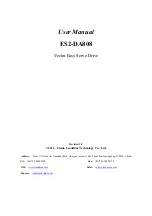
AKD-N Installation | 7 Technical description and data
7.14 Safe Torque Off (STO)
The STO functionality of AKD-N with option "DB" or "DF" or "DG" is controlled by the AKD-C
smart power supply via the specific string, where the AKD-N is connected to. This STO topo-
logy is called "
Global STO
" or "
String STO
".
AKD-N drives with option "DS" or "DT" offer an additional connector X6 with a digital STO-
Enable input. This STO functionality is called "Local STO". These drive variants cannot be
safety controlled by the global STO functionality.
7.14.1 Global STO, control via AKD-C
Connector X16 on the AKD-C offers access to all STO (Safe Torque Off) signals of the
decentral drive system powered by this AKD-C . There is one STO-Enable input and one
STO-Status output for each DC Power string.
The global STO function is described in the
AKD-C Installation Manual.
Application examples can be found in the
Decentralized System Projecting Guide
.
The global STO function uses the following devices: AKD-C, AKD-N without option
"DS/DT", Kollmorgen hybrid connection cable.
In case of using an AKD-N with option "DS" or "DT" (local STO input), the global STO-
Enable signal will have not influence to this specific drive. The local STO-Status of this drive
nevertheless is monitored in the string STO-Status.
7.14.2 Local STO, control via digital input on AKD-N-DS/DT
Option "DS" and "DT" on the AKD-N offer local STO-Enable functionality. There is one STO-
Enable input on X6 and one STO-Status output on X3 for the drive. The STO-Status outputs
on X3 are available only with AKD-N drives with option "DS" or "DT".
7.14.3 Safety characteristic data
The systems are described with the following characteristics:
Structure
STO
ISO
13849-1
MTTF
d
IEC
62061
PFH
[1/h]
SFF
[%]
T
M
[Years]
AKD-C + 1 x AKD-N
global PL d, CAT 3
≥ 100
SIL 2
2.9E-08 97.08
20
AKD-C + 8 x AKD-N
global PL d, CAT 3
≥ 100
SIL 2
2.9E-08 99.44
20
1 x AKD-N-DS/DT
local
PL d, CAT 3
≥ 100
SIL 2
2.9E-08 97.12
20
A very unlikely but possible event can happen, if within a very short time 2 not adjacent
IGBTs will have a short circuit. In such case a movement of a maximum angle of 120° (elec-
trical) can happen. This effect can only happen if the drive is in the function STO. If the total
failure rate of the IGBT is 120 FIT normally for such short circuit 60 FIT will be valid (50:50
model). By such event 2 specific IGBTs have to fail at same time. The calculation shows a
probability of 1.5 * 10
-15
per hour (without common cause failure). Even if the STO function
will be issued for a whole year, this event will only happen every 100 Billion years.
42
Kollmorgen | kdn.kollmorgen.com | February 2018
















































